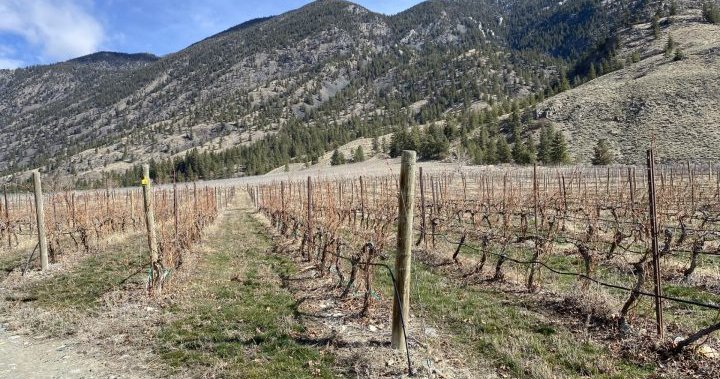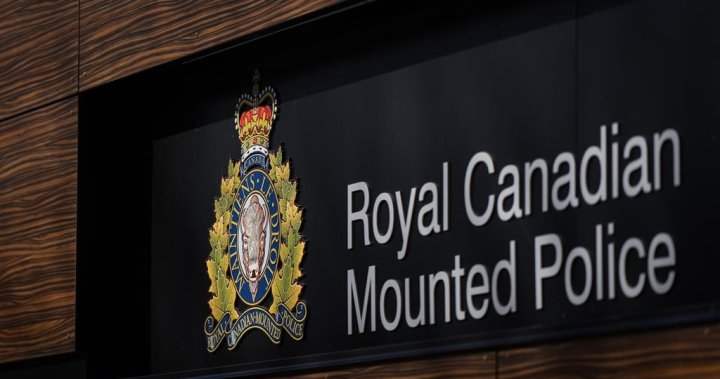The wine industry in British Columbia’s Interior is reeling from the devastating impact of two consecutive winters with severe cold snaps. Grape growers are grappling with major losses that threaten not just their yields but also their livelihoods.
“It’s been catastrophic. There’s been a lot of concern and angst in the community. We are really trying to determine what’s the best way forward,” Wine Growers British Columbia president and CEO Miles Prodan said.
Wineries in the heart of the Interior are bracing themselves for enormous losses in their upcoming vintages. Prodan said the latest cold snap was in January, when temperatures plunged to -30 C, after a similar cold event in 2022, compounding the losses this season.
“We are expecting to have lost 99 per cent of the grapes for this 2024 harvest, ’25 vintage. It’s real, it’s climate change and it’s a culmination of extreme heat and now extreme cold as well,” Prodan said.
With producers having to rebuild and reimagine the future, there are high hopes for a thriving and sustainable wine industry for generations to come — and calls for change.
The owner of Vanessa Vineyard in Cawston, B.C., says while the full extent of the damage won’t be confirmed until the spring, he’s predicting more than 90 per cent crop losses at his operation.
“We are going to replant our whole vineyard, 100 acres over the next three years. So impact-wise, it’s going to be very significant because in two years’ time, we aren’t going to have any wine to sell,” Suki Sekhon said.
Sekhon said the outlook is grim for many in the industry, with smaller, family-run businesses at particular risk of not surviving.
Vanessa Vineyard in Cawston, B.C., faces an uncertain future as producers in the province reel from two consecutive winters with severe cold snaps.
Neetu Garcha / Global News
Government response to ‘catastrophic’ losses
Responding to calls for help, the B.C. government has announced a new task force and replant program to support farmers affected by climate change. Premier David Eby unveiled a $70-million replanting program aimed at assisting growers across the province.
“Hopefully this support enables them to be able to purchase varietals that will be able to survive the kind of extreme temperature swings that we’ve seen, and also respond to changing consumer tastes at the same time, so we could turn a crisis into an opportunity for the whole province,” Eby said on Wednesday.

While welcomed by some, including industry leaders gathered in Penticton for a wine industry summit on Wednesday, others like Sekhon argue that the commitments don’t go far enough. He is calling for systemic changes, such as tax reductions and easing fruit import regulations, as businesses seek greater support to weather the storm and survive long-term.
The email you need for the day’s
top news stories from Canada and around the world.
The email you need for the day’s
top news stories from Canada and around the world.
“It’s the worst system in the world, they overtax us, they don’t provide a service to us. They really need to look at those laws and say, ‘How are we going to support this industry?’” Sekhon said.
The province’s Liquor Distribution Branch (LDB) says it’s reviewing winery agreements to promote agri-tourism and small business.
“The LDB is currently undertaking a review of the winery sales agreements to ensure they continue to align with their original policy intentions, including promoting the use of B.C. agricultural inputs, supporting agri-tourism, encouraging the growth of small B.C. businesses and fostering employment and economic activity,” a statement from the Liquor Distribution Branch said.
B.C.’s government has also announced plans to work with manufacturers to enhance visitor experiences at wineries and promote tourism.
Wine industry forced to pivot
Winemakers say the industry is at a crossroads, being forced to pivot and explore new strategies to adapt to changing environmental conditions. With so much loss and uncertainty, the industry is appealing to consumers to support local wine producers.
“If people are interested in supporting and enjoying B.C. wine, plan a trip to B.C. wine country, wherever it is,” Prodan said.
The situation facing B.C. vineyards with more than 90 per cent predicted crop losses this season is extreme and the response will require innovation, according to John Peller, president of wine producer and distributor Andrew Peller Limited.
“It requires us to be thoughtful in resilience. If we lose 95 per cent of a crop, we need to replace that vintage with wine from another region while labelling honestly and being very transparent with what we are doing,” Peller said.
The future may look different, but with innovation and support, Peller says B.C.’s wine country is poised to emerge stronger than ever before.
“We can get through this and have a bright, bright future, I’m 100 per cent sure, but I think people have to step up and ask how they can help to support people and I think if we do that, we’ll get there,” Peller said.
© 2024 Global News, a division of Corus Entertainment Inc.





